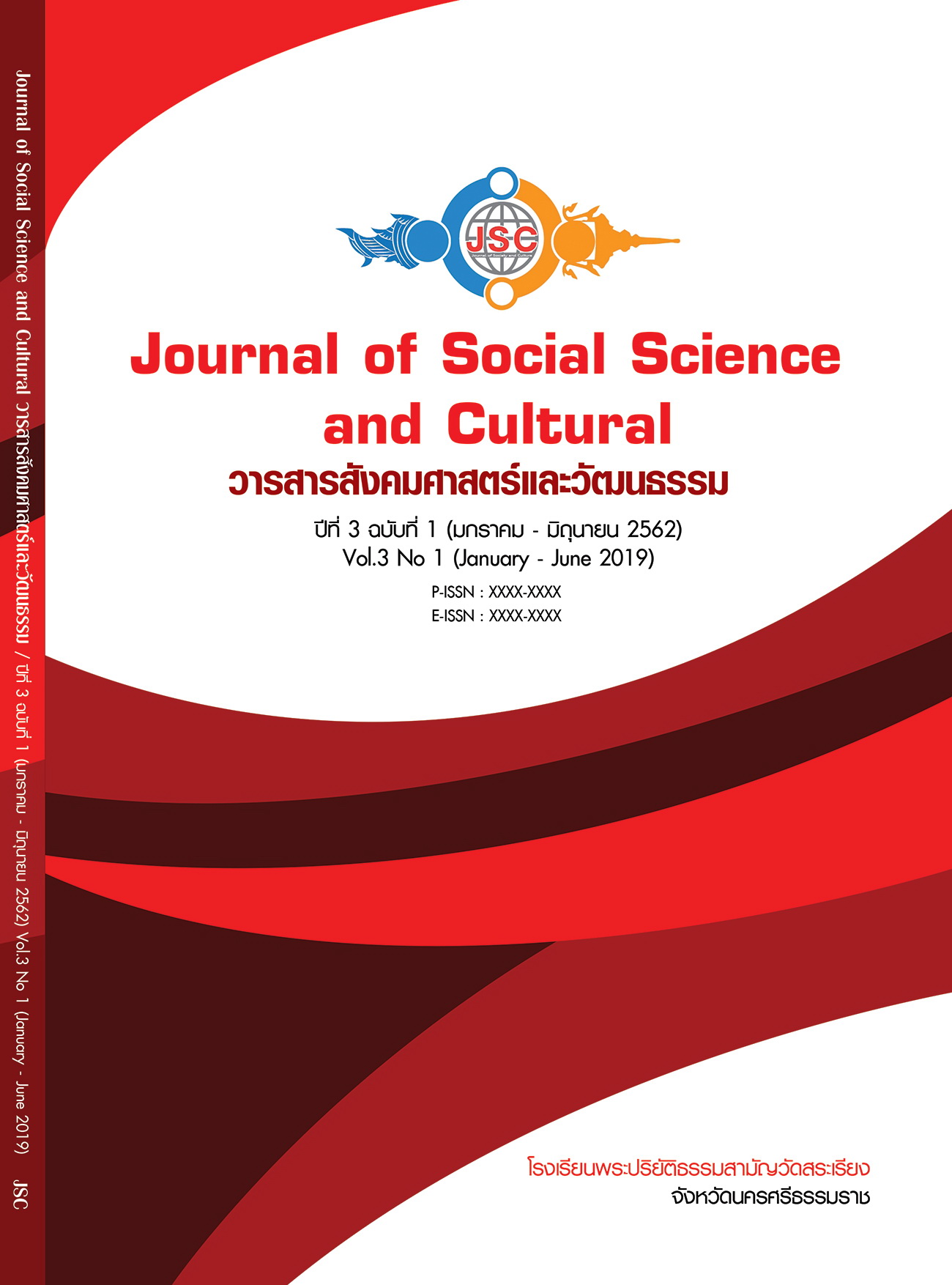GUIDELINES FOR THE CULTIVATE CONSCIOUS OF THE FIVE SACRIFICES (BALIKAMMA) IN THAI SOCIETY AT PRESENT
Main Article Content
Abstract
The purposes of this study were: 1) to study the concept of the cultivate conscious 2) to study the principles of five sacrifices (Balikamma) that appears in Theravada Buddhism scriptures and 3) to study concept of principles of five sacrifices (Balikamma) in Thai society at the present. The study was quantitative research method by the document and in-depth interviews. Select purposive sampling group to represent people with knowledge about five sacrifices (Balikamma) such as: 1) Buddhist’s monk and 2) normal persons for total 15 persons. By analyzing the content and summarizing The research was found that: 1) To cultivate conscious from learning and realize feeling love to other important things, emphasis is placed on teaching ethics in order to raise awareness among learners within 3 parts such as: 1.1) cognitive domain, learning or hand on experience, 1.2) affective domain, psychological feelings or focusing with something, and 1.3) psychomotor domain or expression is the result of learning that occurs after having direct experience with stimuli. 2) The principles of five sacrifices (Balikamma) included with 2.1) Yati Phalee mean give a helping hand to relative who have a trouble, 2.2) Atithi Phalee mean welcoming visitors, self-training to socialize, 2.3) Pubpha Pata Phalee mean making merit and offering to the dead person, 2.4) Racha Phalee mean donation to the country, and 2.5) Thawata Phalee mean making merit dedicated to the deity that protect us. 3) The promotion guidelines are: 3.1) cognitive domain, study for both secular and moral knowledge, 3.2) affective domain, creating a good citizenship consciousness, and 3.3) psychomotor domain, Follow the principles, traditions and religious rituals of Buddhism.
Article Details
References
ธีราพร ทองปัญญา. (2558). จิตสำนึกต่อการพัฒนาชุมชนของเยาวชน: กรณีศึกษากลุ่มเยาวชนอาสาสมัครพัฒนาชุมชนห้วยหมอนทอง. วิทยาสารเกษตรศาสตร์ สาขาสังคมศาสตร์, 36(3), 483-497.
บุญชม ศรีสะอาด. (2556). วิธีการทางสถิติสำหรับการวิจัย เล่ม 2. กรุงเทพมหานคร: สุวีริยาการพิมพ์.
พระครูจิรธรรมนุกูล (ธมฺมงฺกโร/โฉมจังหรีด). (2561). ศึกษาแนวคิดเรื่องปุพพเปตพลีตามแนวพุทธศาสนาเถรวาท. ใน วิทยานิพนธ์พุทธศาสตรมหาบัณฑิต สาขาวิชาพระพุทธศาสนา. มหาวิทยาลัยมหาจุฬาลงกรณราชวิทยาลัย วิทยาเขตนครราชสีมา.
พระพรหมคุณาภรณ์ (ป.อ.ปยุตฺโต). (2540). ธรรมนูญชีวิต. กรุงเทพมหานคร: ธรรมสภา.
พระสุระ ญาณธโร (จันทึก). (2562). การพัฒนาจิตสาธารณะตามแนวทางพุทธศาสนา. ใน งานประชุมวิชาการระดับชาติ ครั้งที่ 2 ประจำปี 2561: เรื่อง “การวิจัยและนวัตกรรมเพื่อการพัฒนาจิตใจและสังคมอย่างยั่งยืนในยุค Thailand 4.0”. สถาบันวิจัยพุทธศาสตร์.
มหาจุฬาลงกรณราชวิทยาลัย. (2539). พระไตรปิฎกภาษาไทย ฉบับมหาจุฬาลงกรณราชวิทยาลัย. กรุงเทพมหานคร: โรงพิมพ์มหาจุฬาลงกรณราชวิทยาลัย.
วรรณิภา สันป่าแก้ว. (2556). แนวทางการเสริมสร้างจิตสำนึกด้านการอนุรักษ์พลังงานของเยาวชน. ใน วิทยานิพนธ์ครุศาสตรมหาบัณฑิต สาขาพัฒนศึกษา. จุฬาลงกรณ์มหาวิทยาลัย.
วันนา ใจรื่น. (2562). แนวทางการส่งเสริมจิตสำนึกหลักพลีกรรม 5 ในสังคมไทยปัจจุบัน. (พระมหาอภิพล อภิพโล, ผู้สัมภาษณ์)
ศูนย์คุณธรรม องค์การมหาชน. (2561). พอเพียง วินัย สุจริต จิตอาสา. กรุงเทพมหานคร: ศูนย์คุณธรรม องค์การมหาชน.
สมเดช นามเกตุ. (2561). การปลูกจิตสำนึกทางจริยธรรมในสังคมไทย. วารสารปัญญาปณิธาน, 3(1), 13-27.
Cronbach, L. J. (1990). Essentials of psychological testing. (5th ed.). New York: Harper Collins Publishers.


